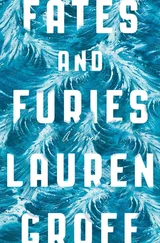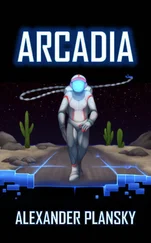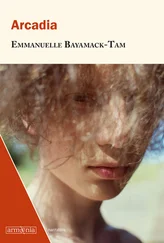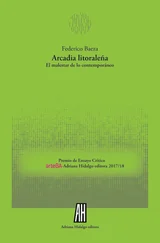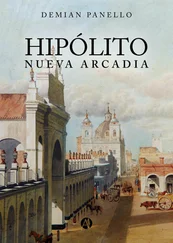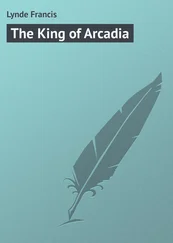Don’t forget, she says, leaning her forehead against his. Me.
I couldn’t, he says.
If you do, it’ll be like I’ve never existed at all.
He’s all knotted up. She kisses him, sharp of teeth, touch of tongue, hands cold on the back of his neck. He wants to tell her so much that he can’t say anything; if he does, he will spill out onto the ground. She holds his hand and Cole’s as they go down the slate steps to the car waiting on the gravel. Before she turns, he pulls out the photograph he’s been carrying in a plastic bag, pinned to the inside of his shorts. He puts it in her hand. It is Helle at the Pond, so early in the morning she thought she was alone, standing naked on the rock, reflected in the glassy water. A taper with a shock of blond dreadlocks at each end, so beautiful, beauty was no longer the word for it. She looks at the picture and winces; she braves a look at his face, and with a terrifying swoop in the chest, he knows she understands. Ike has a pillow over his eyes and won’t look when they knock on the glass.
Helle gets in, the car gentles off. Out of the darkness at the edge of the wood there steps a giant, which is caught now in the headlights and shines. It is an old man, comically bug-eyed, fork-bearded, with bendy spaghetti arms. It waves and bows in graceful, almost human movements. When the car passes beyond and the darkness steals back out from where it had hidden at the edge of the woods, Bit sees Leif under the puppet, still dancing in the dark.
They are one hundred. Regina and Ollie bought a truck in Ilium, a beautiful, sleek Ford with a huge bed. They go to the Bakery in the middle of the night and take the industrial mixers and one of the ovens before anyone has time to stop them. The next day, two old people in a Jaguar show up for Scott and Lisa, and before they are allowed in the car, they must take off their Arcadia clothes and put on new ones, khakis and a button-up shirt and blazer for Scott, a dress and panty hose for Lisa. Bit watches, heartstruck, as Scott and Lisa climb into the backseat and hold hands, and smile uncomfortably at their knees as the driver in his boat shoes and golf pants roars at them, choleric, speeding off.
Hannah says, I always suspected they were secret Republicans.
They were your friends, Bit says.
Friends, Hannah says. What a word.
There are sixty left. The tomatoes rot on the vine.
The toilets back up in Arcadia House, and there is no Horse or Hank to fix them. The smell drives out thirty Arcadians. Hannah makes dinner by herself, out of what they have: tempeh from the freezer, a few cans of beans, some boiled cabbage.
The next day, Sweetie comes to the Ado Unit, trailing Dyllie. His little face is electric with nerves. He is pale, almost as pale as his brother. Sweetie seems heavy with her sorrow and runs her hands over Cole’s head, the hair sparking with static electricity under her palms. We’re going, Cole, she says. A girlfriend of mine’s going to take us to the city.
Down at the car, Cole and Dylan hug Bit wordlessly and get in. The car moves off. After his friends have gone, the sound of a woodpecker in the forest redoubles, festive as castanets. There is a puncture in the world, and everything Bit knew about himself is escaping.
Hannah wakes him in the night. Baby, she murmurs in his ear. Grab your things.
He has kept a brown bag under his bunk for a week now and takes it out, and climbs out of bed, full-clothed. When he stands up, Hannah is already gone. He catches her on the spiral staircase and sees something hard shimmering on her face.
Out into the cool. Down the slate steps. He cannot look back; he knows what happens when one does. There is a car coughing on the drive, a junky Pinto. Abe already sits in the front seat, his wheelchair strapped to the trunk. The family’s few effects are on the backseat, in a box. Bit knows that the faceless cloth babydoll on top, an Amish gift, is stuffed with high-grade bud.
Hannah closes the door and puts the car in gear. The forest is hunched as they slide past, the Gatehouse is dark. The County Road curves to the path that pushes out to Verda lonely in her stone cottage. There, Hannah turns off the engine, and Bit and she climb out (the cherries in full fruit over the night-darkened door making all slick underfoot). Eustace gives a desultory woof, and Verda emerges in a white nightgown, holding her rifle on her shoulder. Slowly, she lowers it.
Oh, she says. The day is come.
I’m sorry, Hannah says in a whisper.
Verda disappears inside. She comes back out with a bundle she places into Bit’s hand. I won’t see you again, Ridley, she says. He hugs her fragile bones. Hannah steps up and hugs her too, and Verda says, Go along then. Her hair blazes in the headlights, but her eyes are only sockets as they pull away.
Bit unwraps the bundle. In it is a bag of rosehip tea, a four-inch thickness of papers bound with a ribbon, the scrimshaw, a wad of cash as soft as mouse fur. He hands the papers to Hannah, who pats them and returns her hand to the wheel, and the money to Abe, who gives a whistle. Bit holds the scrimshaw, feeling the fine carvings with the pads of his fingers until he has memorized the shape of the face repeated in the bone.
He leans his head against the cool window. The same moon hovers. A line flaps with sheets, a mailbox shines. The road passes beyond everything he knows of it. They go around a bend he has never been around, a house he has never seen; all is doubly new, sick with newness. A bridge made of steel; an ice cream parlor; cows, much larger than what he’d imagined cows to be. A sidewalk, a flag on a pole. A brick school. A Ferris wheel. The endless hills, heaped and sleeping.
The sun rises. In the window, it reflects him back to himself. There is so little to Bit: a fine hem of gold hair, the filthy neck of a teeshirt. Fragile, pale flesh over a sharpness of bone, and eyes so vast in his face they threaten to swallow the world just now spinning past, threaten to be swallowed by it.
It is early October. Outside, the city rests between the winding down of day and the winding up of night. The fish-shaped nightlight shines a creamy cup on the wall and Grete is curled against Bit. From where he sits against her headboard, she is all eyelash, forehead, tiny slope of nose, his beautiful daughter.
Sleepy yet? he says, and she says, No.
He doesn’t mind. He could stay here forever against his daughter’s small warmth. He looks at the mural he’s painting on the wall across from her bed, the only thing he can do to fill the restless hour between when he comes home from the university and when Grete is walked back from daycare by Sharon, the mother who lives in the apartment downstairs. Sharon is a small, quick, dark-haired woman. Her name is about all he knows of her; yet Bit feels close to her. He once said, on a morning that he was picking up Frankie, We’re a good team: solidarity of the abandoned! But this was a mistake, and Sharon didn’t smile.
The painting on Grete’s wall is Arcadia, the apple trees twisting up toward Arcadia House, the Octagonal Barn, outhouses, Ersatz Arcadia, Pond. He has spent months detailing the landscape, and now has begun to populate it. The only people in the painting, yet, are essential: Hannah in the garden, Abe in his wheelchair under the courtyard oak, Astrid holding a newborn baby to the sun, Handy on the roof of the Pink Piper. There is Verda and her dog, Eustace, at the edge of the forest, only a dapple of sun if you don’t know to look for them. Cole and Dyllie play cards; Jincy stands in the door of a lean-to, a white bird on her roof; Leif dances under a puppet; Erik sits, a blob; Ike is frozen in a swan dive into the Pond. Bit himself is tiny, studying Helle. She is long and white, on the rock with her feet in the water, a naiad.
Читать дальше
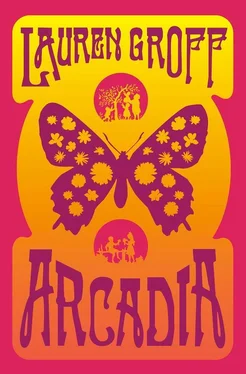
![Andrea Höst - In Arcadia [Touchstone - Extras]](/books/56405/andrea-host-in-arcadia-touchstone-extras-thumb.webp)

